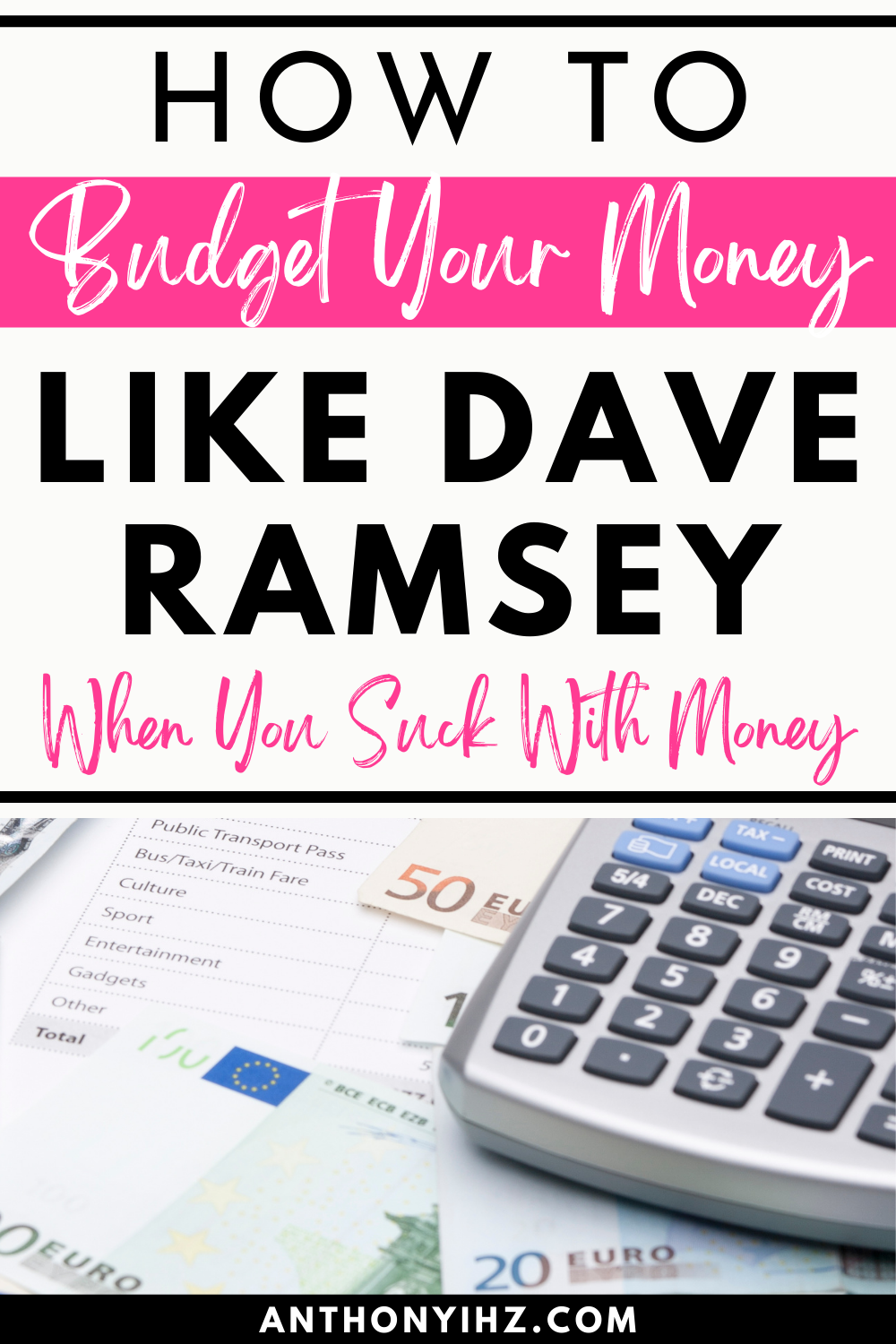
If you were asked to give an accurate account of how you spent your paycheck last month, would you be able to give a reasonable answer? This is not something that should cause you to rack your brain.
If you have a working budget, you will be able to estimate how your money is spent. But if you are not used to budgeting, the Dave Ramsey budget is a perfect budgeting method to help you determine how your money should be spent.
Dave Ramsey has made budgeting so easy that millions of Americans now use his budgeting strategy to keep track of their spending, gain control of their expenses, and ultimately manage their finances.
If you haven’t been budgeting your income all this while, it’s never too late to start with the right decision. This post will duly educate you on how to use the Dave Ramsey budget, and this will enable you to spend your salary or income appropriately.
Why Need A Budget In The First Place?
A budget is like a unit of measurement that helps you determine how much money needs to be spent on something. If you don’t budget your income, you may spend recklessly because there’s no guide. Budgeting also helps you identify your needs instead of getting distracted by your wants.
How Does A Budget Help Your Finances?
A budget helps your finances by showing you what to spend money on and what to avoid. It’s a brilliant way of organizing your expenses rather than spending your money randomly.
More importantly, a budget is important to your finances because it shows you where your money goes. Once all your expenses are itemized in a budget, you can clearly see how your money is being spent.
Dave Ramsey Budget Percentages
Dave Ramsey has recommended the right percentages of your income that should be allocated to every expense. Here are the percentages:
- Giving — 10%
- Saving — 10%
- Food — 10% to 15%
- Utilities — 5% to 10%
- Housing costs — 25%
- Transportation — 10%
- Health — 5% to 10%
- Insurance — 10% to 25%
- Recreation — 5% to 10%
- Personal spending — 5% to 10%
- Miscellaneous — 5% to 10
Dave Ramsey Budget Categories
When budgeting, you are meant to categorize your expenses. As for the Dave Ramsey budget, there are at least 10 categories your hard-earned money should go to. These categories include savings, food, utilities, housing costs, transportation, health, insurance, recreation, personal spending, giving, and miscellaneous.
This is the standard categorization of a budget, especially for people earning significant money every month. If you earn little, you might want to rule out some categories such as recreation and miscellaneous. Notwithstanding, these are the budget categories recommended by Dave Ramsey.
How The Dave Ramsey Budget Works
The Dave Ramsey budget is a straightforward budgeting method. It entails listing your expenses in various categories and allocating a certain percentage of your income to each category. It’s just like a budget-to-zero strategy. Hence, take your time to examine each category of your budget.
Also, you may want to change the percentage allocated to each category. You don’t need to use the Dave Ramsey budget percentages. You just have to categorize your budget to suit your cash flow.

Practical Budgeting Tips From Dave Ramsey
Since you’re currently learning how to budget like Dave Ramsey, you must get acquainted with some of his recommended budgeting tips.
Hence, here are 10 Dave Ramsey tips for budgeting:
1. Start With The Most Important Categories Of Your Budget
One of the main goals of budgeting is to spend money on things that are important to your sustainability. Because of this, it is important to begin your budget with the most important categories.
Based on the categories recommended by Dave Ramsey, it’s obvious that food, utilities, and savings are some of the most important things you must include in your budget.
Remember you feed every day, you incur utility bills daily, and you need to save some too. Once these categories are well taken care of, you can move into other budget categories.
Moreover, beginning your budget with the most important categories is crucial when you aren’t earning a ton of money. If your paycheck is small, you should focus more on only the important budgeting category.
2. Budget With Your Partner

If you are married, the Dave Ramsey Budget should be planned with your partner. Have a family meeting once a month to discuss how the family’s income would be budgeted.
This meeting doesn’t have to be so formal. You can make it fun and spice it up by grabbing some of your favorite snacks while listening to your favorite playlist. This would make both of you relaxed and more focused on the task.
You should budget with your partner because budgeting decisions are not supposed to be made by one person when two persons are responsible for looking after the home. Even if your spouse isn’t bringing any money to the house, building the budget together can help you make the right decisions.
Your spouse could also act as an accountability partner, making sure you stick to the proposed budget.
3. Adjust Your Budget When Necessary

Using the Dave Ramsey budgeting strategy doesn’t mean you may not have to adjust your budget when needed. The reason for this is that every month can’t be the same. You may live through a couple of months that didn’t pose anything out of the ordinary.
However, some months can be quite different, bringing several emergency expenses you never planned for. It would help if you prepare for months like these. Create a rook in your budget to cover some impromptu expenses.
Moreover, this is one reason why you must build an emergency fund and take it seriously. The money you allocate to the savings category is the cash that should be transferred to your emergency fund and retirement fund.
As things change, be observant and adjust your budget accordingly.
4. Budget To Zero Before A New Month
Budgeting to zero before the month begins is advised when using the Dave Ramsey budget. This means that you have to give every dollar a name, allocating it to a particular category until you don’t have any extra cash. This is commonly referred to as a zero-based budget. This doesn’t mean you won’t have any money in your bank account.
For instance, the money you allocate to categories such as Miscellaneous, personal spending, and giving means you still have some reserved amount of money in your account that you are likely to spend as you progress through the month.
5. Pay Off Your Debt
If you have debt that needs to be paid off, do everything to clear it. In fact, it should be your top priority for now.
When there’s debt, it becomes difficult to budget your money properly because a significant amount of your income has to be used to pay the debt. So it’s better you attack your debt and get it paid once and for all rather than allowing it to pile up and affect your finances.
Once your debt is paid, you will have complete control of your money and afford what makes you happy.
6. Have A Schedule You Stick To
Once budgeting becomes a monthly routine, you can pick specific dates for other expenses. What this means is that you can choose to buy your groceries on a set day every week.
On the other hand, you could set up auto drafts of your checking account to get certain bills paid. Doing this would keep you very organized and focused.
More importantly, it will enable you to stick to the proposed budget. Some people set up a budget but later fail to follow it to the end of the month. They probably failed because they don’t have a schedule for spending.
7. Track Your Progress

Knowing how to budget money like Dave Ramsey is not where it all ends. You must learn how to keep track of your progress as well.
From time to time, you need to take your time to check if you are sticking to the budget or if the budgeting method is actually helping your finances. If the budget is improving your finances, that’s a good sign. Your job at that point would be to continue with the budgeting strategy.
However, in a situation where you notice that your budget does not flow well with your finances, it’s time to restrategize and find what works for you. In the process of trying to make budgeting work for you, you may need to bring in extra income.
When your income is not enough to cover your expenses conveniently, no type of budgeting strategy can save you. It will help to find brilliant and creative ways to generate extra cash.
8. Stop Using Credit Cards

If you really want to succeed with the Dave Ramsey budget and avoid debt simultaneously, you must avoid using credit cards. It’s not the best thing to do when trying to build and sustain your finances, except if you are a multimillionaire. Almost every financial expert always advises against using credit cards when budgeting.
You probably haven’t heard this, but the truth about credit cards is that they entrap you into debt and make it seem like they are bailing you out of financial difficulties. You won’t realize how bad it is until you have amassed a lot of debt.
It would be best if you resort to using cash instead. Making purchases with just cash is a brilliant way to avoid overspending and save money.
9. Try An Online Budgeting Tool
If you aren’t comfortable using pen and paper to plan your budget, you should become a part of the trend by using online budgeting tools like EveryDollar.
A tool like this would help you focus on designing a budget and also keep track of your spending. You don’t need a computer to do this. Your smartphone is enough since you can easily find several applications that simplify budgeting.
One good thing about using an online budgeting tool is that you can sync up your budget with your partner. This would keep the communication open while promoting cooperation between you and your partner or spouse.
10. Set Goals
When using the Dave Ramsey budget, it is essential to set goals. That is, you need to build a purpose for creating a budget.
Whether you’re figuring out how to pay your student loan or you simply want to build an emergency fund, there should be a goal that would compel and encourage you to stick to your budget.
By successfully budgeting your income and tracking your progress, you are gradually getting close to achieving your financial goals.
Final Thoughts On Dave Ramsey Budget
While trying to budget your income, you must learn to give yourself some grace. This is because budgeting won’t be easy when you are just trying it for the first time.
It would take a couple of months to get the hang of the whole budgeting idea, whether it’s the Dave Ramsey budgeting method or not. You would need to give yourself a lot of patience instead of getting frustrated when you’re not hitting the milestones you’ve set.
Also, if you don’t have a consistent income, especially when you are a small business owner or freelancer, you can still budget your money with the Dave Ramsey budget. What you need to do is to build your budget based on what a low-earning month looks like. Hence, you will be prepared whether the month is good or bad.
Pin this for later!

